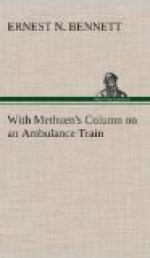All around were signs and tokens of the war. Large transports lay gently rolling upon the swell in every direction, and it was said that not less than sixty ships were lying at anchor together in the bay. H.M.S. Niobe and Doris faced the town, and further off was stationed the Penelope, which had already received its earlier contingents of Boer prisoners. It is very difficult, by the way, to understand how some of these captives contrived later on to escape by swimming to the shore, for, apart from the question of sharks, the distance to the beach was considerable.
On land the whole aspect of the streets was changed. Every few yards one met men in khaki and putties. This cloth looks fairly smart when it is new and the buttons and badges are burnished; but, after a very few weeks at the front, khaki uniforms become as shabby as possible. No one who is going into the firing line has any wish to draw the enemy’s fire by the glint of his buttons or his shoulder-badges, and so these are either removed or left to tarnish. Nor does khaki—at any rate the “drill” variety—improve its beauty by being washed. When one has bargained with a Kaffir lady to wash one’s suit for ninepence it comes back with all the glory of its russet brown departed and a sort of limp, anaemic look about it. And when the wearer has lain upon the veldt at full length for long hours together in rain and sun and dust-storm his kit assumes an inexpressible dowdiness, and preserves only its one superlative merit of so far resembling mother earth that even the keen eyes behind the Mauser barrels fail to spot Mr. Atkins as he lies prone behind his stone or anthill.




